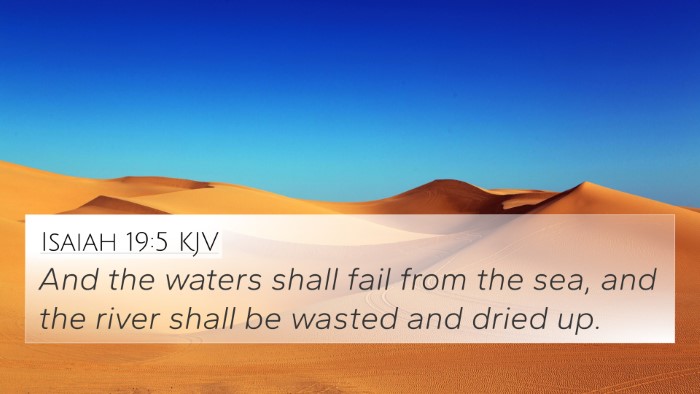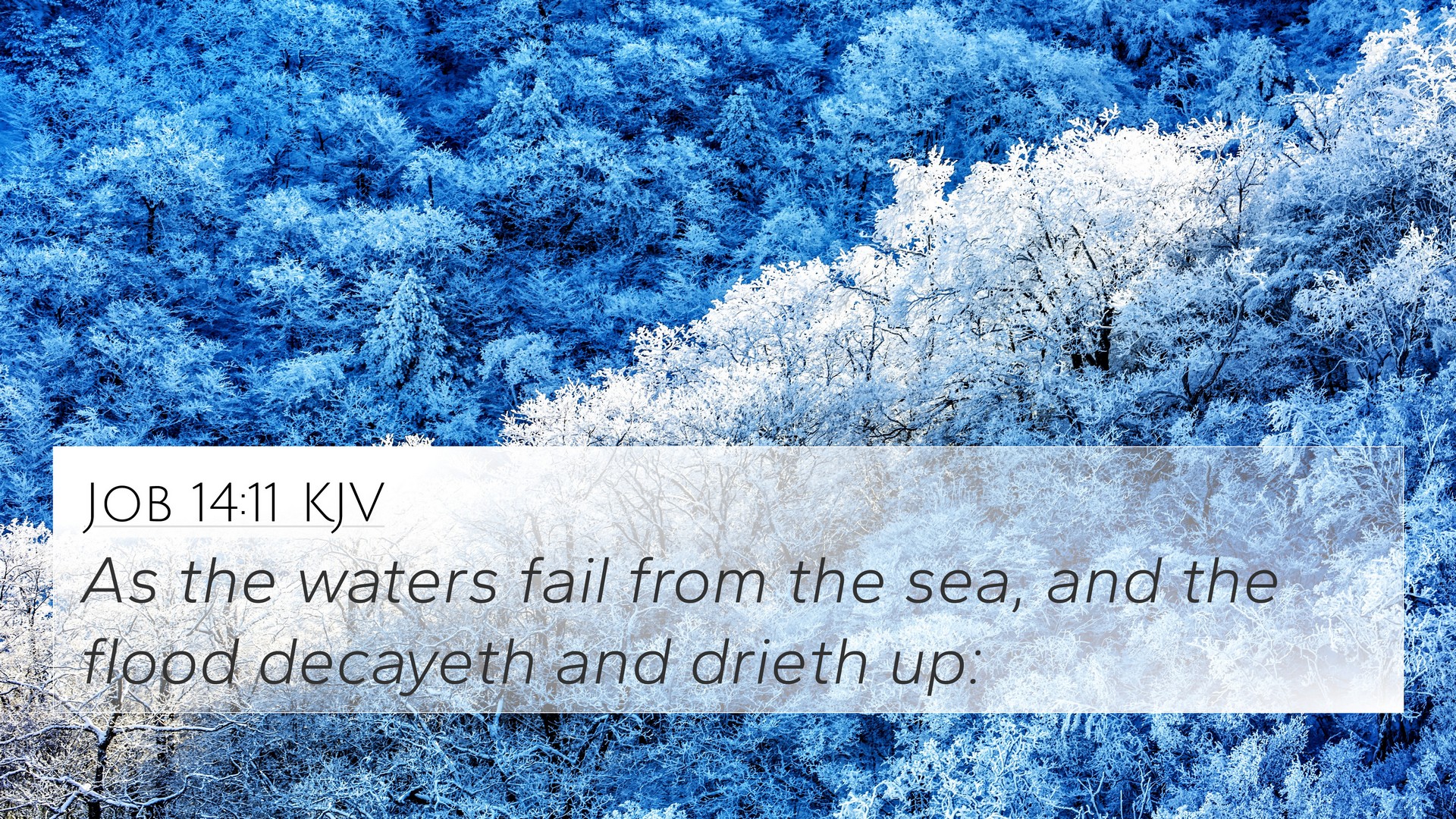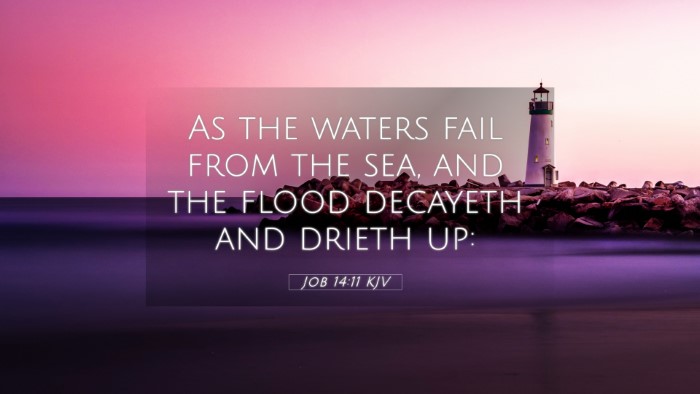Old Testament
Genesis Exodus Leviticus Numbers Deuteronomy Joshua Judges Ruth 1 Samuel 2 Samuel 1 Kings 2 Kings 1 Chronicles 2 Chronicles Ezra Nehemiah Esther Job Psalms Proverbs Ecclesiastes Song of Solomon Isaiah Jeremiah Lamentations Ezekiel Daniel Hosea Joel Amos Obadiah Jonah Micah Nahum Habakkuk Zephaniah Haggai Zechariah MalachiJob 14:11 Similar Verses
Job 14:11 Cross References
As the waters fail from the sea, and the flood decayeth and drieth up:
Uncover the Rich Themes and Topics of This Bible Verse
Listed below are the Bible themes associated with Job 14:11. We invite you to explore each theme to gain deeper insights into the Scriptures.
Job 14:11 Cross Reference Verses
This section features a detailed cross-reference designed to enrich your understanding of the Scriptures. Below, you will find carefully selected verses that echo the themes and teachings related to Job 14:11 KJV. Click on any image to explore detailed analyses of related Bible verses and uncover deeper theological insights.

Isaiah 19:5 (KJV) »
And the waters shall fail from the sea, and the river shall be wasted and dried up.

Job 6:15 (KJV) »
My brethren have dealt deceitfully as a brook, and as the stream of brooks they pass away;

Jeremiah 15:18 (KJV) »
Why is my pain perpetual, and my wound incurable, which refuseth to be healed? wilt thou be altogether unto me as a liar, and as waters that fail?
Job 14:11 Verse Analysis and Similar Verses
Understanding Job 14:11
Job 14:11 states, "As the waters fail from the sea, and the flood decayeth and drieth up." This verse is pivotal in understanding the transience of life and the inevitability of death, drawing a parallel between natural elements and human existence.
Summary of Meaning
The essence of this verse encapsulates the theme of mortality. Job, in his suffering, reflects on the fleeting nature of life and compares it to the water in the sea, which can dwindle and diminish. Through the imagery of drying up floods, Job emphasizes that just as nature undergoes cycles of change, so too does human life.
Commentary Insights
- Matthew Henry: Henry highlights that Job's lamentation illustrates the deep sorrow associated with human suffering and death. He suggests that there is a futility in life, as it is as unpredictable and transient as the water in the sea.
- Albert Barnes: Barnes notes that this imagery serves to remind readers of the fragility of life. He discusses the natural order and how it parallels the human experience, indicating that just like floods can recede, human strength and vitality are also temporary.
- Adam Clarke: Clarke emphasizes the metaphorical nature of the verse, illustrating that Job understands his plight in the broader context of life's impermanence. He applies a philosophical interpretation, suggesting that acknowledging our mortality can lead to deeper insights about existence.
Cross-References
To better understand Job 14:11, it is beneficial to consider the following cross-references:
- Psalms 90:5-6: "Thou carryest them away as with a flood; they are as a sleep: in the morning they are like grass which groweth up."
- Ecclesiastes 1:4: "One generation passeth away, and another generation cometh: but the earth abideth forever."
- Isaiah 40:6-7: "The voice said, Cry. And he said, What shall I cry? All flesh is grass, and all the goodliness thereof is as the flower of the field: the grass withereth, the flower fadeth."
- James 4:14: "For what is your life? It is even a vapor, that appeareth for a little time, and then vanisheth away."
- Job 7:9-10: "As the cloud is consumed and vanisheth away: so he that goeth down to the grave shall come up no more."
- 1 Peter 1:24: "For all flesh is as grass, and all the glory of man as the flower of grass. The grass withereth, and the flower thereof falleth away."
- Hebrews 9:27: "And as it is appointed unto men once to die, but after this the judgment."
- Job 14:1-2: "Man that is born of a woman is of few days and full of trouble. He cometh forth like a flower, and is cut down: he fleeth also as a shadow, and continueth not."
- Ecclesiastes 3:1: "To every thing there is a season, and a time to every purpose under the heaven."
- Matthew 6:30: "Wherefore, if God so clothe the grass of the field, which to day is, and to morrow is cast into the oven, shall he not much more clothe you, O ye of little faith?"
Thematic Connections
This verse resonates with several thematic Bible verse connections, emphasizing:
- The inevitability of death
- The transient nature of life
- The comparison of human life to nature
- How suffering paves the way for philosophical inquiries about existence
- Understanding mortality through the lens of scripture
Conclusion
In summary, Job 14:11 serves as a profound reminder of the delicate nature of life and the inevitability of death. By engaging in a comparative analysis with related scripture, one can uncover the deep inter-Biblical dialogue surrounding life’s temporality. This structured cross-referencing is essential for anyone seeking a deeper understanding of biblical teachings regarding the human condition.


